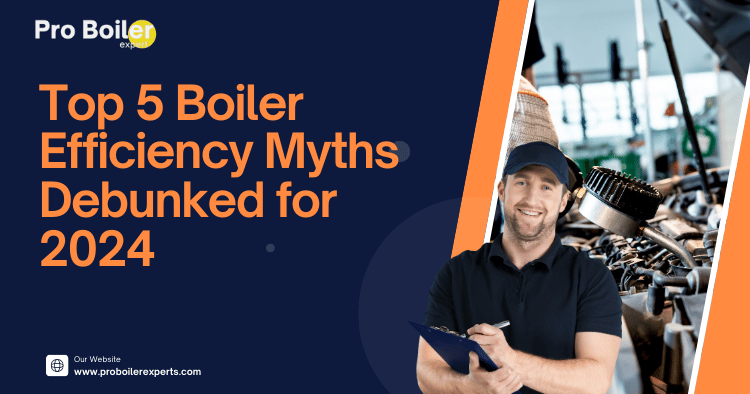Table of Contents
- Introduction
- Myth 1: All Boiler Types Are Equally Efficient
- Myth 2: Regular Maintenance Isn’t Necessary for Efficiency
- Myth 3: Bigger Boilers Are Always More Efficient
- Myth 4: The Age of Your Boiler Doesn’t Matter
- Myth 5: Higher Energy Ratings Always Mean Lower Bills
- Conclusion
- FAQs
Introduction
As we step into 2024, many homeowners and businesses alike are looking for ways to optimize their heating systems. Boilers play a crucial role in providing warmth, but misinformation surrounding boiler efficiency can lead to costly mistakes. In this article, we’ll debunk the top five myths about boiler efficiency so you can make informed decisions and ensure your heating system operates at its best.
Myth 1: All Boiler Types Are Equally Efficient
The Truth
Not all boilers are created equal. Efficiency varies significantly based on the type of boiler you use. Here’s a quick overview of the main types:
| Boiler Type | Efficiency Rating | Description |
|---|---|---|
| Conventional | 60-80% | Uses a tank to store hot water, losing heat through flue gases. |
| Combi | 90%+ | Heats water on demand, eliminating storage losses. |
| System | 85-95% | Similar to conventional but has built-in components that make installation easier and more efficient. |
| Condensing | 90-98% | Captures waste heat to preheat incoming water, maximizing efficiency. |
For more details on the benefits of different boiler types, check our articles on Combi Boilers and Condensing Boilers.
Conclusion
Choosing the right type of boiler for your needs can significantly impact your overall efficiency and energy bills.
Myth 2: Regular Maintenance Isn’t Necessary for Efficiency
The Truth
Ignoring regular maintenance can lead to decreased efficiency and increased energy bills. Boilers are complex systems that need routine check-ups to function optimally. Here are a few reasons why maintenance is crucial:
- Preventive Measures: Regular servicing can identify potential issues before they escalate, saving you from costly repairs down the line.
- Efficiency Boost: A well-maintained boiler operates more efficiently, which means it uses less fuel to produce the same amount of heat.
- Safety: Regular inspections can help prevent dangerous situations, such as carbon monoxide leaks.
Best Practices
Consider having your boiler serviced at least once a year by a certified technician. Check out the
Energy Saving Trust for more details on maintenance tips.
Also, you can explore the importance of professional maintenance services in our article on the
Myth 3: Bigger Boilers Are Always More Efficient
The Truth
Bigger doesn’t always mean better when it comes to boilers. In fact, an oversized boiler can lead to inefficiencies. Here’s why:
- Short Cycling: An oversized boiler heats up too quickly and shuts down, leading to frequent start-stop cycles that use more energy.
- Increased Wear and Tear: This constant cycling can wear out components faster, leading to more repairs and a shorter lifespan.
- Heat Loss: Larger boilers may have more heat loss due to a larger surface area, which can negate their efficiency benefits.
Finding the Right Size
The best approach is to have a heating professional perform a load calculation to determine the appropriate size for your space. This ensures you get a boiler that meets your heating needs without excess capacity. For more insights into selecting the right boiler, see our guide on
Myth 4: The Age of Your Boiler Doesn’t Matter
The Truth
The age of your boiler significantly affects its efficiency. Older models, particularly those manufactured before the 1990s, are generally less efficient than modern systems. Key points to consider include:
- Technological Advances: Newer boilers often incorporate advanced technology that allows for better fuel utilization and lower emissions.
- Energy Ratings: Many older systems have lower energy ratings, meaning they consume more energy to produce the same amount of heat as newer models.
- Potential Savings: Upgrading to a modern boiler can lead to significant savings on your energy bills over time.
When to Upgrade
If your boiler is over 15 years old, it’s worth considering an upgrade. The
Department of Energy has resources to help you assess your current system and potential savings.
You can also check out our article on
When to Replace Your Boiler for guidance.
Myth 5: Higher Energy Ratings Always Mean Lower Bills
The Truth
While higher energy ratings generally indicate better efficiency, they don’t always translate to lower energy bills. Here’s why:
- Usage Patterns: Your actual energy consumption depends on how you use your heating system. A highly-rated boiler running inefficiently due to improper use can still lead to high bills.
- Installation Quality: A poorly installed boiler, regardless of its efficiency rating, can lead to significant losses. Proper installation is crucial for any system to perform at its best.
- Overall System Design: The efficiency of your entire heating system (including radiators and insulation) plays a role in your energy costs.
Final Thoughts
When shopping for a new boiler, consider both the energy rating and how well it fits into your existing heating system. A well-designed and installed system will yield the best results. For more information on energy-efficient options, check out our article on
Conclusion
Understanding the myths surrounding boiler efficiency is essential for making informed decisions about your heating system. By debunking these misconceptions, you can ensure you’re maximizing your boiler’s performance, cutting down on energy costs, and contributing to a more sustainable environment.
FAQs
Q1: How often should I service my boiler?
A1: It’s recommended to service your boiler at least once a year to ensure it operates efficiently and safely.
Q2: What is the average lifespan of a boiler?
A2: Most boilers can last between 10 to 15 years, depending on the type and how well they’ve been maintained.
Q3: What’s the best type of boiler for my home?
A3: The best type depends on your heating needs, space, and budget. Consult with a heating professional for personalized advice.
Q4: Can I improve my existing boiler’s efficiency?
A4: Yes! Regular maintenance, upgrading controls, and ensuring proper insulation can enhance your existing boiler’s efficiency.
For more information on energy efficiency and heating systems, visit
This article aims to provide a friendly, informative overview of common boiler efficiency myths, helping you navigate your heating system decisions with confidence. For further resources on choosing the right boiler, explore our detailed guides and comparisons available throughout our site.





